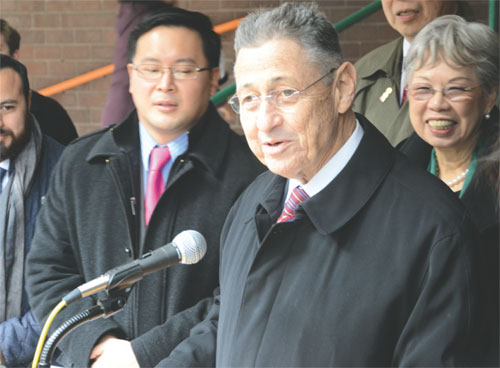NYC schools can mark Lunar New Year
New York City must consider making the Chinese Lunar New Year a public school holiday under a new law signed by Governor Andrew Cuomo that the city's Asian residents have sought for years.
Cuomo signed the law on Wednesday night. It requires the city's education department to consider closing individual public schools or district-wide if "a religious or cultural day of observance" may bring "a considerable proportion" of students being absent.
"We are committed to having a school calendar that reflects and honors the extraordinary diversity of our students. Adding new holidays to the calendar is a goal that poses some logistical challenges and we are actively working toward overcoming them," Yuridia Pea, deputy press secretary of the city's education department, told China Daily on Thursday.
Earlier on Thursday, Assembly Speaker Sheldon Silver, who co-sponsored the legislation, announced Cuomo's signing of the bill with community leaders in Chinatown. The State Senate passed the bill in May, and the State Assembly approved it in February. Most of the legislation's sponsors are non-Asians, with both Republicans and Democrats voting for the bill.
Lunar New Year, which usually falls between mid-January and mid-February, is one of the most important holidays in Asian cultures, and is celebrated across Asian communities. The 2015 Lunar New Year is on Feb 19, when the public schools will be in winter recess.
It is estimated that about one in six New York City public school students is Asian American. To celebrate the Lunar New Year, a student has had to take an "excused" absence, which is put on their record. Despite the excuse requirement, many Asian students still celebrated the holiday, causing attendance at some schools in Chinatown and in the heavily Asian-populated Flushing in Queens to decline to about 40 percent.
"This is a long time coming. This is such an important bill to really show that we have the honor to celebrate our culture and diversity, and to recognize the contribution of Asian Americans to this country and to this city," said New York City Council member Margaret Chin.
New York State Senator Daniel Squadron, who also was a co-sponsor of the bill, said he will work with the city "so parents do not have to make that choice" between going to school or celebrating the Lunar New Year.
"I try to let them know about all their cultures," said Lillane Mair, a mother of two mix-raced Asian children, one 4 years old and the other 6. "It's very important for us to maintain our culture identity. The passing of Lunar New Year [law] really identifies us as part of society."
"They (teachers) still have to come in when there are few kids around," said Sui Ling Tsang, co-president of the Parent-Teachers Association at a public school in Chinatown. "[The law] is a good thing. Kids don't need to come, and they don't learn anything anyway."
Wellington Chen, executive director of the Chinatown Partnership Local Development Corporation and a community leader, told China Daily that it took a lot of effort to get the law.
In 2012, US Representative Grace Meng, who was an Assemblywoman at the time, and Squadron wrote to then-Mayor Michael Bloomberg, urging him to make Lunar New Year a public school holiday, but he turned down their request.
There are estimated over 1.2 million documented and undocumented Asian Americans in the city, representing about 13 percent of the total population, according to New York University's website. The Asian-American population increased by 110 percent from 1990 to 2010, according to the website.
Lu Huiquan in New York contributed to this story.
|
New York State Assembly Speaker Sheldon Silver (center) announces a law that will require the New York City to consider closing schools on Lunar New Year, together with other elected officials and community leaders in Chinatown, Manhattan, New York on Dec 18. Lu Huiquan / for China Daily |



















